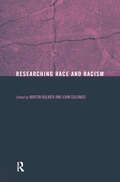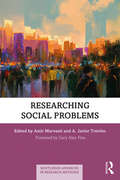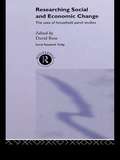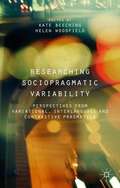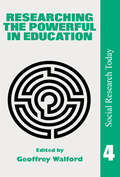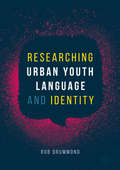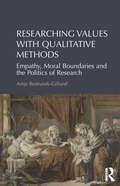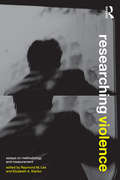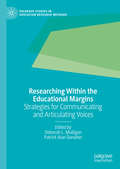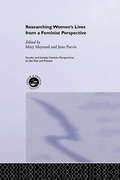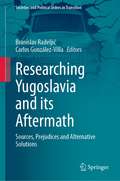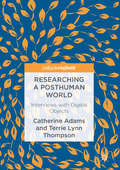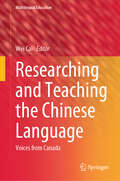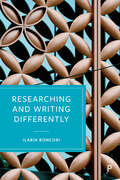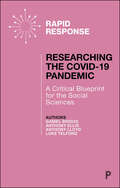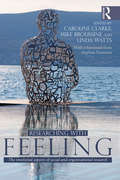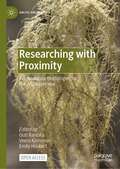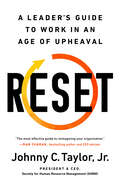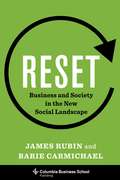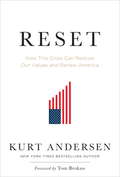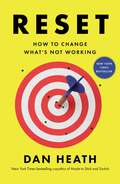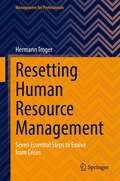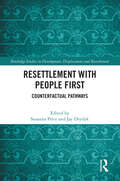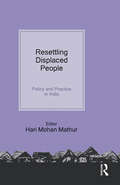- Table View
- List View
Researching Race and Racism (Social Research Today)
by John Solomos Martin BulmerRace and racism have become huge areas of study in the social sciences over the past two decades. However, whilst this has been reflected in the growing body of theoretical and empirically based work, surprisingly little has been published that explores the methodological and practical issues involved in researching race. In Researching Race and Racism Martin Bulmer and John Solomos have brought together contributions from some of the leading researchers in the field, using the benefit of their experience to explore the practical and ethical issues involved in doing research in this sometimes controversial, often heavily politicised field. This book will provide students and researchers - both new to the field and experienced alike - with an invaluable tool to help them find their way.
Researching Resilience
by Michael Ungar Linda LiebenbergWhile categorization has always been one of the primary focuses of the social sciences, recent trends within these disciplines have tended to categorize various behaviours as disorders. Researching Resilience challenges this tendency to pathologize, and marks a profound shift in research methods from the study of disorder to the study of well-being.This collection assembles qualitative and quantitative studies from a diverse group of scholars and disciplines, stressing the importance of studying the strength and resilience of youth who are faced with adversity. Working with youth in a variety of cultures and contexts, the contributors provide critically astute analyses of existing scholarship as well as rigorous methods for conducting resilience research in less Eurocentric and more culturally sensitive ways.An important collection, Researching Resilience is unique in approaching interventions with youth specifically from the point of view of research methods and challenges.
Researching Social Problems (Routledge Advances in Research Methods)
by Amir Marvasti A. Javier TreviñoThis book covers a wide range of contemporary methods for researching social problems and connects these approaches to the broader substance and theories of social problems. Expository and discursive in approach, chapters follow a uniform structure, with each offering research examples and a broad description of the related method and its theoretical context, together with a "how-to" guide for applying that method using substantive examples from the field of social problems. For every method explored, there is a research example that fully reviews and illustrates the application of the particular method, before giving a full assessment of the method’s strengths and weaknesses and latest developments. With chapters exploring survey interviews, in-depth interviews, narrative inquiry, institutional ethnography, participatory action research, auto-ethnography, Actor-Network Theory, experimental research, visual research methods, and research ethics, Researching Social Problems will appeal to scholars and students of sociology and politics working in the fields of research methods and social problems.
Researching Social and Economic Change: The Uses of Household Panel Studies (Social Research Today Ser. #Vol. 12)
by David RoseIn this user-friendly introduction, European and American experts in the field join forces to explain what panel studies can achieve and to illustrate some of the potential pitfalls in the construction and analysis of panel data. Household panel studies provide one of the most significant national and international resources for analysing social and economic change. This is an essential and accessible introduction for those contemplating the use of panel studies for the first time and will be an invaluable resource for both practising researchers and the commissioners of research.
Researching Sociopragmatic Variability: Perspectives from Variational, Interlanguage and Contrastive Pragmatics
by Kate Beeching Helen WoodfieldResearching Sociopragmatic Variability showcases a range of research approaches to the study of speech acts and pragmatic markers across different languages and varieties of a language, investigating native and non-native usages and variation across gender, situation and addressee.
Researching The Powerful In Education (Social Research Today Ser. #Vol. 4)
by Geoffrey WalfordEducationalists offer an overview of methods for researching those in positions of power. They focus on key issues with broad relevance to social scientists such as access, interviewing, data restrictions, ethical dilemmas and the role of theory.; This book is intended for academic and postgraduate researchers within education, sociology, social policy and politics as well as advanced undergraduates involved with research dissertations. The book's international appeal is enhanced by the contributions of US and UK authors.
Researching Urban Youth Language and Identity
by Rob DrummondThis book examines how urban adolescents attending a non-mainstream learning centre in the UK use language and other semiotic practices to enact identities in their day-to-day lives. Combining variationist sociolinguistics and ethnographically-informed interactional sociolinguistics, this detailed and highly reflexive account provides rich descriptions and discussions of the linguistic processes at work in a previously underexplored research environment. In doing so, it reveals fresh insights into the changes taking place in urban British English, and into the difficulties of undertaking ethnographic, sociolinguistic research in a challenging context using a combination of methods and approaches. This interdisciplinary work will appeal to students and scholars from across the fields of sociolinguistics, ethnography, and education; as well as providing a valuable resource for teachers and trainees.
Researching Values with Qualitative Methods: Empathy, Moral Boundaries and the Politics of Research
by Antje Bednarek-GillandIn several branches of social science, interest in values and moral evaluations has increased in recent years, with group values taking centre-stage, yet a satisfactory, theoretical account of the concept of values and their role in social life remains lacking. Engaging with theories of value formation and the role of values in everyday life found in ethics, classical sociology and contemporary social theory and their implications for empirical work, Researching Values with Qualitative Methods argues for a pragmatist approach both to understanding values and the manner in which they are formed, as well as exploring the ways in which they can be studied empirically, using qualitative research methods. In this way, this book promises to resolve many of the practical problems involved in fieldwork with political groups, including the prominent question of how to account for the researcher's own values. Illustrated with examples from published as well as new research, this book provides the foundation for the theoretical understanding of values and their empirical investigation, thus strengthening the connection between social theory and the development of research methods. As such, it will be of interest to sociologists, anthropologists and geographers with interests in values, social theory and research methodology.
Researching Violence: Methodology and Measurement
by Elizabeth A. Stanko Raymond M. LeeViolence is a research topic that is fraught with difficulties. A notoriously sensitive subject, and one that is presumed to be largely hidden, researchers have long struggled with the question of how to measure its impact and how to explore its incidence. Arising from the ESRC's Violence Research Programme, Researching Violence is a practical guide both to theses problems and to the obstacles encountered when negotiating this uneasy terrain. Comprising the reflections of researchers who have worked on diverse projects - from violence in the home to racial violence and homicide - this book demonstrates the ingenuity and at times courageous actions of researchers having to think on their feet. It also investigates the ethical and emotional issues arising from working with the victims and perpetrators of violence. This book will be indispensable for students and academics doing research projects on violence.
Researching Within the Educational Margins: Strategies for Communicating and Articulating Voices (Palgrave Studies in Education Research Methods)
by Patrick Alan Danaher Deborah L. MulliganThis book explores the challenges and considerations of researchers who work on the educational margins of society. It investigates the diverse and specific research strategies that have been developed to ensure research is authentic, ethical, rigorous, situated and, where possible, empowering. Traversing cutting-edge global research, the chapters demonstrate the effectiveness of specific research methods when researching within educational margins related to particular ‘wicked problems’. Against a backdrop of increasing scrutiny of the conduct of researchers working with marginalised people, this book provides an informed and empowering overview of research methods for those working with marginalised groups.
Researching Women's Lives From A Feminist Perspective (Gender And Society Ser.)
by June Purvis Mary MaynardWomen's studies is a rapidly expanding field with a tremendous growth in the number of London courses available. As a result of this there has been increasing debate about the nature of feminist research. Can a specifically feminist methodology be identified? Which research methods are most appropriate in feminist work? What is the difference between a feminist approach and other forms of scholarship.; "Researching Women's Lives" explores these issues by focusing on the dynamics of doing research, rather than engaging in a theoretical discussion about research techniques. Feminists are now involved in exploring a whole range of wider issues concerned with practical, political and ethical matters in undertaking research. In addition to issues such as violence, sexuality, political activity and popular culture, contributors also examine the impact of race, class, sexual orientation and age.
Researching Yugoslavia and its Aftermath: Sources, Prejudices and Alternative Solutions (Societies and Political Orders in Transition)
by Branislav Radeljić Carlos González-VillaIn Researching Yugoslavia and its Aftermath, a common thread is the authors’ path through the time and space context in which fieldwork has taken place. Accordingly, this collection tackles problems that have always existed but have not been dealt with in a single volume. In particular, it examines a range of methodological questions arising from the contributors’ shared concerns, and thus the obstacles and solutions characterising the relationship between researchers and their objects of study. Being an interdisciplinary project, this book brings together highly regarded historians, sociologists, anthropologists, political scientists, cultural and social theorists, as well as experts in architecture and communication studies. They share a belief that the awareness of the researcher’s own position in fieldwork is a precondition of utmost significance to comprehend the evolution of objects of study, and hence to ensure transparency and ultimate credibility of the findings. Moreover, the contributors come from diverse backgrounds, including authors from the former Yugoslavia and others who have made their way to the region after starting their research careers; some from universities in the area, others from institutions in the Global North. Here, they explore cross-cutting issues such as the repercussions of gender, nationality, institutional affiliation and the consequences of their entry into the field. This is examined in terms of the results of the research and the ethical aspect of the relationship with the object of study, as well as the implications of the chosen time framework in the methodological design and the clash between this decision and the interests of the actors studied.
Researching a Posthuman World: Interviews with Digital Objects
by Catherine Adams Terrie Lynn ThompsonThis book provides a practical approach for applying posthumanist insights to qualitative research inquiry. Adams and Thompson invite readers to embrace their inner – and outer – cyborg as they consider how today’s professional practices and everyday ways of being are increasingly intertwined with digital technologies. Drawing on posthuman scholarship, the authors offer eight heuristics for “interviewing objects” in an effort to reveal the unique – and sometimes contradictory – contributions the digital is making to work, learning and living. The heuristics are drawn from Actor Network Theory, phenomenology, postphenomenology, critical media studies and related sociomaterial approaches. This text offers a theoretically informed yet practical approach for asking critical questions of digital and non-digital things in professional and personal spaces, and ultimately, for considering the ethical and political implications of a technology mediated world. A thought-provoking and innovative study, this book will be of great interest to scholars and researchers of technology studies, digital learning, and sociology.
Researching and Teaching the Chinese Language: Voices from Canada (Multilingual Education #47)
by Wei CaiThis book offers an in-depth exploration of the unique landscape of Chinese language learning and teaching in Canada. It is the first to highlight the distinctive features of Chinese language education in the country and to introduce the Canadian approach to teaching and researching Chinese language, termed the "Canadian school of Chinese education." This approach, largely unfamiliar to the global academic community, is illuminated in this book, filling a critical gap in the literature and providing a platform for Canadian voices and perspectives in the field. The book delves into original and under-investigated areas, addressing important issues in Chinese teaching and learning that require more sophisticated research approaches due to advancements in our understanding and the discovery of complex Chinese learner populations. Structured into four sections, the book offers an overview of Chinese language education in Canada, examines comparisons of learning conditions, explores interactive dynamics and communication strategies, and delves into social and cultural dimensions. This book will be invaluable to researchers, instructors, advanced-level undergraduate students, and graduate students in the field of Chinese language learning and teaching.
Researching and Writing Differently
by Ilaria BoncoriIn a neoliberal academia dominated by masculine ideals of measurement and performance, it is becoming more important than ever to develop alternative ways of researching and writing. This powerful new book gives voice to non-conforming narratives, suggesting innovative, messy and nuanced ways of organizing the reading and writing of scholarship in management and organization studies. In doing so it spotlights how different methods and approaches can represent voices of inequality and reveal previously silenced topics. Informed by feminist and critical perspectives, this will be an invaluable resource for current and future scholars in management and organization studies and other social sciences.
Researching the COVID-19 Pandemic: A Critical Blueprint for the Social Sciences
by Daniel Briggs Anthony EllisIn challenging social science’s established orthodoxies, this first in a series of books is a call for its disciplines to embrace new theoretical paradigms and research methods to better understand the reality of life in a post-COVID world. By offering a detailed insight into the harmful effects of neoliberalism before the pandemic, as well as the intervallic period the world is currently living through, the authors show how it is more important than ever for social science to evolve and take a leading role in contextualising the biggest crisis of the 21st century. This is a critical blueprint for ongoing debates about the COVID-19 pandemic and alternative modes of research.
Researching with Feeling: The Emotional Aspects of Social and Organizational Research
by Caroline Clarke Mike Broussine Linda WattsWhy should researchers be interested in their feelings and emotions as they carry out research? Emotion is what it is to exist, to be human, and is present in every sphere of our lives. All activities are infused with emotion, even those that are constructed as ‘rational’, because rationality and emotionality are interpenetrated and entwined because all thinking is tinged with feeling, and all feeling is tinged with thinking. This book illuminates the emotional processes of doing social and organizational research, and the implications of this for the outcomes of research. With contributions from leading academics and research practitioners, it addresses the significant issue of the sometimes intense emotional experiences involved in doing research and the implications it has for the theory and practice of social research. By examining the nature of feelings and emotions, it explores how we might understand researchers’ emotions and experiences, and considers the often powerful feelings encountered in a variety of research contexts. Topics discussed include: power relations; psycho-social explanations of researcher emotions; paradoxical relations with research participants and the sometimes disturbing data that is gained; research supervision; the politics of research; gender; publishing, undergoing vivas and presenting at conferences. This book will therefore be a valuable companion to researchers and research students from the start of their career onwards.
Researching with Proximity: Relational methodologies for the Anthropocene (Arctic Encounters)
by Emily Höckert Outi Rantala Veera KinnunenThis open access book presents a series of speculative, experimental modes of inquiry in the present times of environmental damage that have come to be known as the age of the Anthropocene. Throughout the book authors develop more nuanced ways of engaging with the environmentally vulnerable Arctic. They counter distancing, exoticising, and even apocalyptic imaginaries of the Arctic by staying proximate with mundane places and beings of the north. The volume engages and plays with familiar tourism concepts, such as hospitality, visiting, difference, care, openness, and distance, while expanding the focus from binary and human-centric approaches of hosts and guests to questions of wellbeing among multispecies communities. The transdisciplinary group of contributors share a curiosity about how staying proximate may provide theoretical depth and epistemological openings to attend to current tensions and to diversify the ways we do and enact research. Thus, each chapter provides a methodological experiment with proximity, developing diverse ways of envisioning and storying more-than-human worlds.
Reset: A Leader's Guide to Work in an Age of Upheaval
by Johnny C. Taylor Jr.From the CEO and President of the Society for Human Resource Management (SHRM) comes the ultimate book on transforming the way we select, retain and train our employees in a radically changed business environment. With the growth of remote work and an increased focus on diversity and inclusion, companies are increasingly finding themselves in &“wars for talent&” as they source and recruit candidates from all over the world. They need to find new ways to contact people and new sources of talent. They need to create an enduring and tangible culture that helps everyone feel empowered to do their best work. And they need to develop inclusive organizations that leverage differences for growth and innovation. Informed by more than 70 years of experience and expertise and propelled by extensive original SHRM research, Reset delivers a candid and forward-thinking vision for leaders to reimagine their company cultures in a time of global upheaval. Part call to action, part strategic roadmap, Reset challenges business leaders&’ underlying assumptions about workers and the workplace, delivers practical strategies for finding and keeping the talent needed to make businesses successful, and introduces dynamic tools to sustain that success over the long haul. Now is the time for leaders to completely reimagine, reorganize, and Reset their operations to create a more daring, resilient and sustainable future. This is the book that will guide them exactly when they most need it.
Reset: Business and Society in the New Social Landscape (Columbia Business School Publishing)
by James Rubin Barie CarmichaelAs consumers, our access to—and appetite for—information about what and how we buy continues to grow. Powered by social media, increasingly we look at the companies behind the products and are disappointed when their actions do not meet our expectations. With engaged citizens acting as 24/7 auditors of corporate behavior, one formerly trusted company after another has had their business disrupted with astonishing velocity in the wake of what, in the past, might have been written off as a bad media cycle. Gone are the days when a company could hide behind “socially responsible” branding or when marketing controlled the corporate narrative. That control has shifted to engaged stakeholders in the new social landscape, requiring a more radical change to company practices.James Rubin and Barie Carmichael provide a strategic roadmap for businesses to navigate the new era, rebuild trust, and find their voice. Reset traces the global decline of trust in business at the same time that the public’s expectations for business’s role in society is increasing. Today, businesses must bridge this widening gap at a time when online stakeholders are committed to holding business accountable for its behavior, with unprecedented internal and external scrutiny. This requires strategic solutions anchored in a critical outside-in understanding of the stakeholder footprint of the business model. Reset offers case studies of reputations lost and found, suggesting fundamental strategies to mitigate risk and build the corporate brand. In this new era of instant transparency, corporate behavior has become the proof of corporate character for recruiting and retaining both customers and the next generation of talent. Offering essential advice for managing brand, reputation, and risk, this book is a guide to navigating the pitfalls and taking advantage of the opportunities of the reset.
Reset: How This Crisis Can Restore Our Values and Renew America
by Kurt Andersen"This is the end of the world as we've known it," Kurt Andersen writes in Reset. "But it isn't the end of the world." In this smart and refreshingly hopeful book, Andersen--a brilliant analyst and synthesizer of historical and cultural trends, as well as a bestselling novelist and host of public radio's Studio 360--shows us why the current economic crisis is actually a moment of great opportunity to get ourselves and our nation back on track. Historically, America has always shifted between wild, exuberant speculation and steady, sober hard work, as well as back and forth between economic booms and busts, and between right and left politically. This is one of the rare moments when all these cycles shift dramatically and simultaneously--a moment when complacency ends, ossified structures loosen up, and enormous positive change is possible. The shock to the system can enable each of us to rethink certain habits and focus more on the things that make us authentically happy. The present flux can enable us as a society to consolidate the enormous gains of the last several decades in areas such as technology, crime prevention, women's and civil rights, and the democratization of the planet. We can reap the fruits of a revival of realism and pragmatism at home and abroad. As we enter a new era of post-party-line common sense, we can start to reinvent hopelessly broken systems-in health care, education, climate change, and more-and rediscover some of the old-fashioned American values of which we've lost sight. In Reset, Andersen explains how we've done it before and why we are about to do it again--and better than ever.
Reset: How to Change What's Not Working
by Dan HeathFrom the #1 New York Times bestselling coauthor of Made to Stick, Switch, and The Power of Moments comes a revolutionary guide to fixing what&’s not working—in systems and processes, organizations and companies, and even in our daily lives—by identifying leverage points and concentrating resources to achieve our goals.Changing how we work can feel overwhelming. Like trying to budge an enormous boulder. We&’re stifled by the gravity of the way we&’ve always done things. And we spend so much time fighting fires—and fighting colleagues—that we lack the energy to shift direction. But with the right strategy, we can move the boulder. In Reset, Heath explores a framework for getting unstuck and making the changes that matter. The secret is to find &“leverage points&”: places where a little bit of effort can yield a disproportionate return. Then, we can thoughtfully rearrange our resources to push on those points. Heath weaves together fascinating examples, ranging from a freakishly effective fast-food drive-thru to a simple trick from couples therapy to an inspirational campaign that saved a million cats. In Reset, you&’ll learn: -Why the feeling of progress can be your secret weapon in accelerating change -How leaders can uncover and stop wasteful activities -Why your team&’s motivation is often squandered—and how to avoid that mistake -How you can jumpstart your change efforts by beginning with a &“burst&” The book investigates mysteries: Why the middle is the roughest part of a change effort. Why inefficiency can sometimes accelerate progress. Why getting &“buy-in&” is the wrong way to think about change. What if we could unlock forward movement—achieving progress on what matters most—without the need for more resources? The same people, the same assets…but dramatically better results. Yesterday, we were stuck. Today, we reset.
Resetting Human Resource Management: Seven Essential Steps to Evolve from Crises (Management for Professionals)
by Hermann TrogerIn times of globalization, digitalization and demographic change, the COVID-19 pandemic has shown us the fragility and complexity of the world of work. It represents the peak of a process of change in the world of work in economic, social, socio-political and individual psychological terms. This book outlines how effective and future-oriented human resource management can look like in times of demographic and technological change on the one hand and the immediate and lasting effects of the coronavirus pandemic on the other hand. It provides the tools for effective human resource management, summarized in the following seven success factors: demographic-oriented recruitment, strength-oriented workforce deployment, age-appropriate HR development, new generation contract, family and gender, the vital employee, management of interests and expectations. The aim of the book is not only to provide solutions to problems caused by the changing world of work and the pandemic, but also to show how success factors can emerge from these inevitable phenomena. It will be of interest to professionals in the field of human resource management.
Resettlement with People First: Counterfactual Pathways (Routledge Studies in Development, Displacement and Resettlement)
by Jay DrydykShould people in the way lose out as new reservoirs, mines, plantations, or superhighways displace them from their homes and livelihoods? What if the process of resettlement were made accountable to those impacted, empowering them to achieve just outcomes and to share in the benefits of development projects? This book seeks to answer these questions, putting forward powerful counterfactual case studies to assess what problems real-world development projects would likely have avoided if the project had included the affected people in decision making about whether and how they should resettle. Drawing on contributions from leading and emerging scholars from around the world, this book considers cases involving dams, mines, roads, and housing, amongst others, from Asia, Africa, and South America. In each case, the counterfactual approach invites us to reconsider how the dynamics of accountability play out through resettlement hazards and the asymmetries of power relations in the negotiation of displacement benefits and redress. Considering a range of theoretical and ethical perspectives, the book concludes with practical, alternative policy suggestions for displacement arising both from development and from slow onset climate change. This book’s novel approach focussing on the people's agency in the dynamics of governance, accountability, and (dis)empowerment in development projects with displacement and resettlement will appeal to academic researchers, development practitioners, and policymakers.
Resettling Displaced People: Policy and Practice in India
by Hari Mohan MathurDevelopmental projects have long been displacing people in large numbers every year, but it is only in recent years that the fate of those adversely affected has become an issue of widespread concern requiring urgent action. This volume is the scholarly exploration of these critical issues in a wider perspective, examining resettlement policies as well as resettlement strategies, their strengths, their weaknesses, the persisting gap between policy and its actual practice and the means to improve resettlement outcomes. This volume is well-structured into four parts: (a) Displacement and Resettlement in Developmental Projects (b) Re-examining Resettlement Policies (c) Addressing Resettlement Concerns and (d) Resettlement in a Globalizing World. It goes beyond the common description of resettlement problems and attempts at gaining a deeper understanding of resettlement realities. In a separate section, the book discusses the hotly debated current issues of resettlement policy and practice in the context of globalization. The volume contains original case studies which will bring to academic and policy tables a body of important new ideas that will stimulate debates and also hopefully change and improve current practices. The contributors to this volume are eminent scholars, including some who have played a vital role in shaping resettlement policies as well as in implementing projects at the grassroots level.
